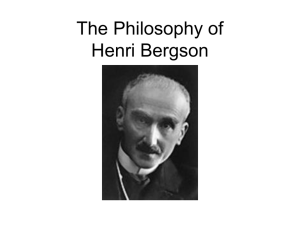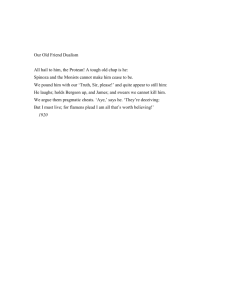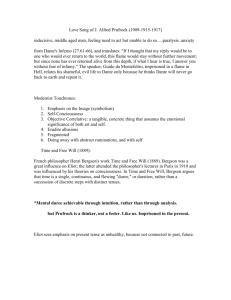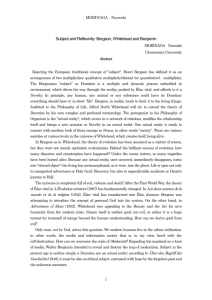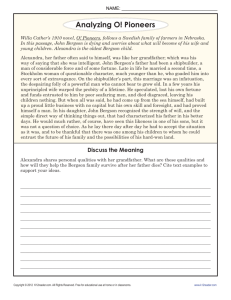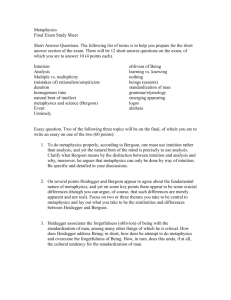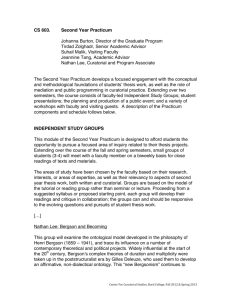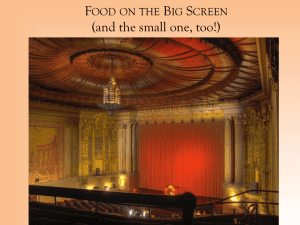PLEASE NOTE this is a sample reading list for the... – precise seminar content may change from year to year.
advertisement
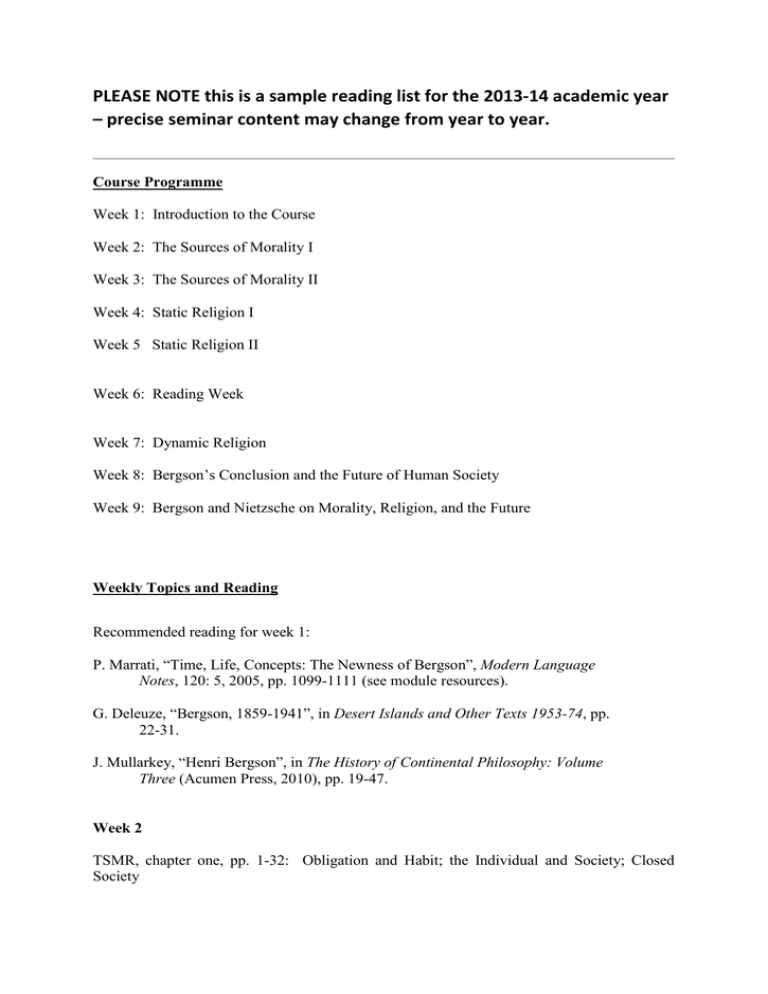
PLEASE NOTE this is a sample reading list for the 2013-14 academic year – precise seminar content may change from year to year. Course Programme Week 1: Introduction to the Course Week 2: The Sources of Morality I Week 3: The Sources of Morality II Week 4: Static Religion I Week 5 Static Religion II Week 6: Reading Week Week 7: Dynamic Religion Week 8: Bergson’s Conclusion and the Future of Human Society Week 9: Bergson and Nietzsche on Morality, Religion, and the Future Weekly Topics and Reading Recommended reading for week 1: P. Marrati, “Time, Life, Concepts: The Newness of Bergson”, Modern Language Notes, 120: 5, 2005, pp. 1099-1111 (see module resources). G. Deleuze, “Bergson, 1859-1941”, in Desert Islands and Other Texts 1953-74, pp. 22-31. J. Mullarkey, “Henri Bergson”, in The History of Continental Philosophy: Volume Three (Acumen Press, 2010), pp. 19-47. Week 2 TSMR, chapter one, pp. 1-32: Obligation and Habit; the Individual and Society; Closed Society C. Power, “Bergson’s Critique of Practical Reason”, in A. Lefebvre & M. White (eds.), Bergson, Religion, and Politics (Duke University Press, 2012), pp. 174192. F. Worms, “The Closed and the Open in TSMR: A Distinction that changes everything”, in A. Lefebvre & M. White (eds.), Bergson, Religion, and Politics (Duke University Press, 2012), pp. 25-40. Week 3 TSMR chapter one, pp. 32-101: Complete Morality, the Open Soul, and Creative Emotion; Plus: Life and Impetus (54ff.); Philosophy (60ff.); Reason (68ff., 89ff); Moral Progress (80ff). F. Worms, “Is Life the Double Source of Ethics? Bergson’s Ethical Philosophy between Immanence and Transcendence”, JBSP, 35: 1, 2000, pp. 82-9. Week 4 TSMR chapter two, pp. 102-140 (approx.): The Myth-Making Function, the Vital Impetus (pp. 111ff.), the Origins of Intelligence and Sociability, Life (118ff.), Religion and Intelligence & Social Preservation, Religion and death Plus see: Bergson, Creative Evolution, chapter one on the Vital Impetus, Mechanism and Finalism. J. Mullarkey, “Life, Movement, and the Fabulation of the Event”, Theory, Culture, Society, 24: 6, 2007, pp. 53-70 (see Module Resources). Week 5 TSMR chapter two, pp. 140-208: Chance (148ff.), Intelligence (1611ff.), Confidence in Life (152ff., 164ff.), the Myth-Making Function again (195ff.). D. Lapoujade, “The Normal and the Pathological in Bergson”, Modern Language Notes, 120: 5, 2005 (see Module Resources). Week 7 TSMR chapter three, pp. 209-65: Life & Attachment to Life (209ff.), Mysticism (213ff.), the Mystic and Humanity (234ff.), Vital Impetus and Creative Evolution (249ff.), F. Keck, “Assurance and Confidence in the TSMR: A Sociological Interpretation of the Distinction between Static Religion and Dynamic Religion”, in Lefebvre & White, pp. 265-81. P. Marrati, ‘Mysticism and the Foundation of the Open Society: Bergsonian Politics’, in Hent de Vries (ed.), Political Theologies (Fordham UP, 2006), pp. 591-601. Week 8 TSMR Conclusion, pp, 266-317: The Closed and the Open (266ff.), Origins of Society (275ff.), Origins of War (283ff.), the law of twofold frenzy (296ff.), The Mechanical and the Mystical (307ff.), Joy (317). Suzanne Guerlac, “Bergson, the Void, and Politics of Life”, in A. Lefebvre & M. White (eds.), Bergson, Religion, and Politics (Duke University Press, 2012), pp. 40-61. Philippe Soulez, “Bergson as Philosopher of War and Theorist of the Political”, in Lefebvre & White, pp. 99-125. Leonard Lawlor, ‘Asceticism and Sexuality: “Cheating Nature” in Bergson’s Two Sources’, in Lefebvre & White, pp.144-59. Week 9 Nietzsche, Beyond Good and Evil (Oxford World Classics), section 230, and chapters three, five, and nine; On the Genealogy of Morality (Cambridge UP), preface and essay one; Thus Spoke Zarathustra (Oxford World Classics), Prologue. KAP and Jim Urpeth, ‘Bergson and Nietzsche on Religion’, in Lefebvre & White, pp. 246-65.
